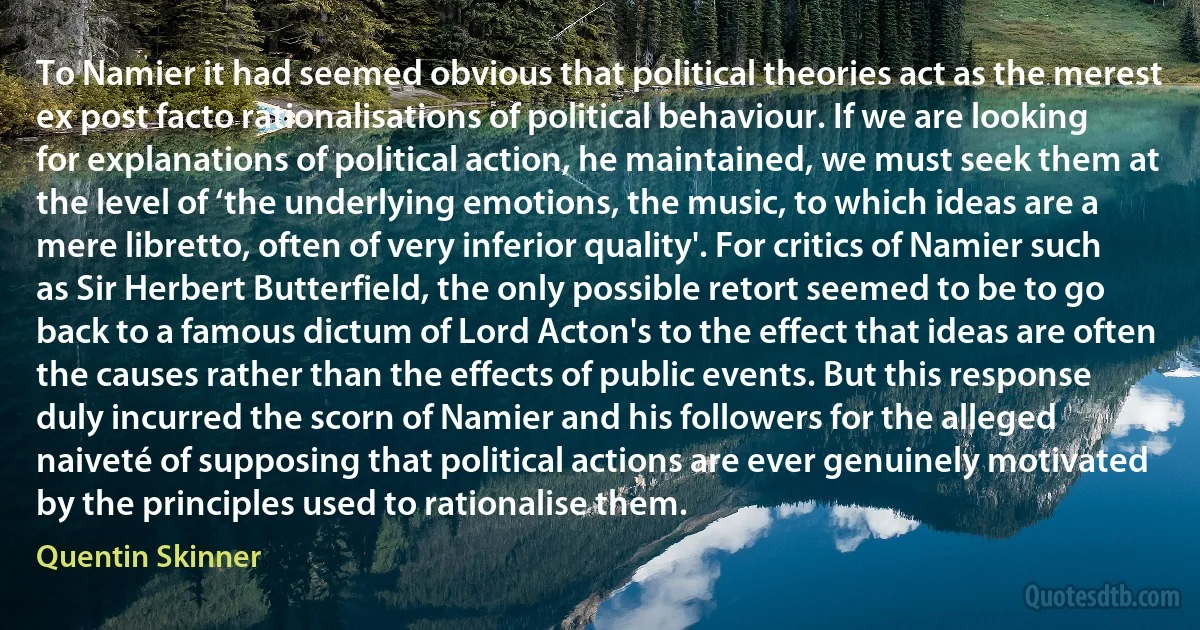
To Namier it had seemed obvious that political theories act as the merest ex post facto rationalisations of political behaviour. If we are looking for explanations of political action, he maintained, we must seek them at the level of ‘the underlying emotions, the music, to which ideas are a mere libretto, often of very inferior quality'. For critics of Namier such as Sir Herbert Butterfield, the only possible retort seemed to be to go back to a famous dictum of Lord Acton's to the effect that ideas are often the causes rather than the effects of public events. But this response duly incurred the scorn of Namier and his followers for the alleged naiveté of supposing that political actions are ever genuinely motivated by the principles used to rationalise them.
Quentin SkinnerRelated topics
act action dictum inferior looking lord mere music naivete possible public quality retort seek herbertRelated quotes
For what advantage is it, that the world enjoys profound peace, if thou art at war with thyself? This then is the peace we should keep. If we have it, nothing from without will be able to harm us. And to this end the public peace contributes no little: whence it is said, ‘That we may lead a quiet and peaceable life.' But if any one is disturbed when there is quiet, he is a miserable creature. Seest thou that He speaks of this peace which I call the third (inner, ed.) kind? Therefore when he has said, ‘that we may lead a quiet and peaceable life,' he does not stop there, but adds ‘in all godliness and honesty.' But we cannot live in godliness and honesty, unless that peace be established. For when curious reasonings disturb our faith, what peace is there? or when spirits of uncleanness, what peace is there?

John Chrysostom
Extreme states of being, whether individual or collective, were once purposefully motivated. Some of those purposes no longer have meaning (expiation, salvation). The well-being of communities is no longer sought through means of doubtful effectiveness, but directly, through action. Under these conditions, extreme states of being fell into the domain of the arts, and not without a certain disadvantage. Literature (fiction) took the place of what had formerly been the spiritual life; poetry (the disorder of words) that of real states of trance. Art constituted a small free domain, outside action: to gain freedom it had to renounce the real world. This is a heavy price to pay, and most writers dream of recovering a lost reality. They must then pay in another sense, by renouncing freedom.

Georges Bataille
One can imagine a computer simulation of the action of peptides in the hypothalamus that is accurate down to the last synapse. But equally one can imagine a computer simulation of the oxidation of hydrocarbons in a car engine or the action of digestive processes in a stomach when it is digesting pizza. And the simulation is no more the real thing in the case of the brain than it is in the case of the car or the stomach. Barring miracles, you could not run your car by doing a computer simulation of the oxidation of gasoline, and you could not digest pizza by running the program that simulates such digestion. It seems obvious that a simulation of cognition will similarly not produce the effects of the neurobiology of cognition.

John Searle
As scientists, we understand the dangers of nuclear weapons and their devastating effects, and we are learning how human activities and technologies are affecting climate systems in ways that may forever change life on Earth. As citizens of the world, we have a duty to alert the public to the unnecessary risks that we live with every day, and to the perils we foresee if governments and societies do not take action now to render nuclear weapons obsolete and to prevent further climate change... There's a realization that we are changing our climate for the worse. That would have catastrophic effects. Although the threat is not as dire as that of nuclear weapons right now, in the long term we are looking at a serious threat.

Stephen Hawking
To make a law final, so as not to be reached by Congress, is, by mere legislation, to fasten a new provision on the Constitution. Nay, more; it gives to the law a character which the very Constitution docs not possess. The wise fathers did not treat the country as a Chinese foot, never to grow after infancy; but, anticipating Progress, they declared expressly that their great Act is not final. According to the Constitution itself, there is not one of its existing provisions - not even that with regard to fugitives from labor - which may not at all times be reached by amendment, and thus be drawn into debate. This is rational and just. Sir, nothing from man's hands, nor law, nor constitution, can be final. Truth alone is final.

Charles Sumner
